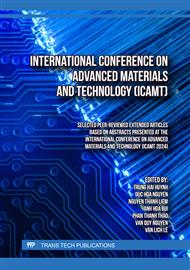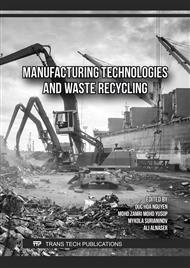[1]
A. Kumar, Y. Gori, A. Kumar, C.S. Meena, N. Dutt, Advanced Materials for Biomedical Applications, CRC Press, Boca Raton, 2022.
Google Scholar
[2]
Y.F. Zheng, X.N. Gu, F. Witte, Biodegradable metals, Materials Science and Engineering R: Reports 77 (2014) 1–34.
DOI: 10.1016/j.mser.2014.01.001
Google Scholar
[3]
H. Li, S.M. Oppenheimer, S.I. Stupp, D.C. Dunand, L.C. Brinson, Effects of Pore Morphology and Bone Ingrowth on Mechanical Properties of Microporous Titanium as an Orthopaedic Implant Material, Mater Trans 45 (2004) 1124–1131.
DOI: 10.2320/matertrans.45.1124
Google Scholar
[4]
Y. Zhang, S. Bai, M. Riede, E. Garratt, A. Roch, A comprehensive study on fused filament fabrication of Ti-6Al-4V structures, Addit Manuf 34 (2020).
DOI: 10.1016/j.addma.2020.101256
Google Scholar
[5]
M. Zuldesmi, A. Waki, K. Kuroda, M. Okido, Hydrothermal treatment of titanium alloys for the enhancement of osteoconductivity, Materials Science and Engineering: C 49 (2015) 430–435.
DOI: 10.1016/J.MSEC.2015.01.031
Google Scholar
[6]
Y. Orlova, K. Maekawa, H.J. Rack, Structure formation during preparation of variable porosity titanium foams by solid state replication, in: Key Eng Mater, Trans Tech Publications Ltd, 2010: p.165–170.
DOI: 10.4028/www.scientific.net/KEM.436.165
Google Scholar
[7]
B. Ye, D.C. Dunand, Titanium foams produced by solid-state replication of NaCl powders, Materials Science and Engineering: A 528 (2010) 691–697.
DOI: 10.1016/J.MSEA.2010.09.054
Google Scholar
[8]
W. Abd-Elaziem, M. Khedr, A.-E. Farouk, M. M. Awdallah, A. Mousa, H. Yehia, W. Daoush, M. Abd El-baky, Particle-Reinforced Polymer MatrixComposites (PMC) Fabricated by 3DPrinting, J Inorg Organomet Polym Mater 33 (2023).
DOI: 10.1007/s10904-023-02819-1
Google Scholar
[9]
Y. Zhao, Y. Hou, Z. Li, Z. Wang, X. Yan, Powder-Based 3D Printed Porous Structure and Its Application as Bone Scaffold, Front Mater 7 (2020).
DOI: 10.3389/fmats.2020.00150
Google Scholar
[10]
N. Taniguchi, S. Fujibayashi, M. Takemoto, K. Sasaki, B. Otsuki, T. Nakamura, T. Matsushita, T. Kokubo, S. Matsuda, Effect of pore size on bone ingrowth into porous titanium implants fabricated by additive manufacturing: An in vivo experiment, Materials Science and Engineering: C 59 (2016) 690–701.
DOI: 10.1016/J.MSEC.2015.10.069
Google Scholar
[11]
N. Hrabe, T. Gnäupel-Herold, T. Quinn, Fatigue properties of a titanium alloy (Ti–6Al–4V) fabricated via electron beam melting (EBM): Effects of internal defects and residual stress, Int J Fatigue 94 (2017) 202–210.
DOI: 10.1016/J.IJFATIGUE.2016.04.022
Google Scholar
[12]
S. Guddati, A.S.K. Kiran, M. Leavy, S. Ramakrishna, Recent advancements in additive manufacturing technologies for porous material applications, International Journal of Advanced Manufacturing Technology 105 (2019) 193–215.
DOI: 10.1007/s00170-019-04116-z
Google Scholar
[13]
Z. Wang, M. Zhang, Z. Liu, Y. Wang, W. Dong, S. Zhao, D. Sun, Biomimetic design strategy of complex porous structure based on 3D printing Ti-6Al-4V scaffolds for enhanced osseointegration, Mater Des 218 (2022) 110721.
DOI: 10.1016/J.MATDES.2022.110721
Google Scholar
[14]
Z.H. Zhang, Z.F. Liu, J.F. Lu, X.B. Shen, F.C. Wang, Y.D. Wang, The sintering mechanism in spark plasma sintering - Proof of the occurrence of spark discharge, Scr Mater 81 (2014) 56–59.
DOI: 10.1016/j.scriptamat.2014.03.011
Google Scholar
[15]
T. Borkar, S. Nag, Y. Ren, J. Tiley, R. Banerjee, Reactive spark plasma sintering (SPS) of nitride reinforced titanium alloy composites, J Alloys Compd 617 (2014) 933–945.
DOI: 10.1016/j.jallcom.2014.08.049
Google Scholar
[16]
A. Sabahi Namini, S.N. Seyed Gogani, M. Shahedi Asl, K. Farhadi, M. Ghassemi Kakroudi, A. Mohammadzadeh, Microstructural development and mechanical properties of hot pressed SiC reinforced TiB2 based composite, Int J Refract Metals Hard Mater 51 (2015) 169–179.
DOI: 10.1016/j.ijrmhm.2015.03.014
Google Scholar
[17]
A. Nouri, P.D. Hodgson, C. Wen, Biomimetic Porous Titanium Scaffolds for Orthopedic and Dental Applications, in: A. Mukherjee (Ed.), Biomimetics, IntechOpen, Rijeka, 2010: p. Ch. 21.
DOI: 10.5772/8787
Google Scholar
[18]
Kenzo Asaoka, Norihiko Kuwayama, Osamu Okuno, Ishi Miura, Mechanical properties and biomechanical compatibility of porous titanium for dental implants, J Biomed Mater Res 19 (1985) 699–713. https://doi.org/.
DOI: 10.1002/jbm.820190609
Google Scholar
[19]
C. Yang, H. Guo, D. Mo, S. Qu, X. Li, W. Zhang, L. Zhang, Bulk TiB2-Based Ceramic Composites with Improved Mechanical Property Using Fe–Ni–Ti–Al as a Sintering Aid, Materials 7 (2014) 7105–7117.
DOI: 10.3390/ma7107105
Google Scholar
[20]
C. Yang, M.D. Zhu, X. Luo, L.H. Liu, W.W. Zhang, Y. Long, Z.Y. Xiao, Z.Q. Fu, L.C. Zhang, E.J. Lavernia, Influence of powder properties on densification mechanism during spark plasma sintering, Scr Mater 139 (2017) 96–99.
DOI: 10.1016/J.SCRIPTAMAT.2017.06.034
Google Scholar
[21]
C. Yang, D.G. Mo, H.Z. Lu, X.Q. Li, W.W. Zhang, Z.Q. Fu, L.C. Zhang, E.J. Lavernia, Reaction diffusion rate coefficient derivation by isothermal heat treatment in spark plasma sintering system, Scr Mater 134 (2017) 91–94.
DOI: 10.1016/J.SCRIPTAMAT.2017.03.005
Google Scholar
[22]
C. Yang, L.M. Kang, X.X. Li, W.W. Zhang, D.T. Zhang, Z.Q. Fu, Y.Y. Li, L.C. Zhang, E.J. Lavernia, Bimodal titanium alloys with ultrafine lamellar eutectic structure fabricated by semi-solid sintering, Acta Mater 132 (2017) 491–502.
DOI: 10.1016/J.ACTAMAT.2017.04.062
Google Scholar
[23]
A. Bansiddhi, D.C. Dunand, Shape-memory NiTi foams produced by solid-state replication with NaF, Intermetallics (Barking) 15 (2007) 1612–1622.
DOI: 10.1016/J.INTERMET.2007.06.013
Google Scholar
[24]
C.E. Wen, M. Mabuchi, Y. Yamada, K. Shimojima, Y. Chino, T. Asahina, Processing of biocompatible porous Ti and Mg, Scr Mater 45 (2001) 1147–1153.
DOI: 10.1016/S1359-6462(01)01132-0
Google Scholar
[25]
A. Mansourighasri, N. Muhamad, A.B. Sulong, Processing titanium foams using tapioca starch as a space holder, J Mater Process Technol 212 (2012) 83–89. https://doi.org/10.1016/J.JMATPROTEC. 2011.08.008.
DOI: 10.1016/j.jmatprotec.2011.08.008
Google Scholar
[26]
T. Aydoǧmuş, Ş. Bor, Processing of porous TiNi alloys using magnesium as space holder, J Alloys Compd 478 (2009) 705–710.
DOI: 10.1016/J.JALLCOM.2008.11.141
Google Scholar
[27]
N. Jha, D.P. Mondal, J. Dutta Majumdar, A. Badkul, A.K. Jha, A.K. Khare, Highly porous open cell Ti-foam using NaCl as temporary space holder through powder metallurgy route, Mater Des 47 (2013) 810–819.
DOI: 10.1016/J.MATDES.2013.01.005
Google Scholar
[28]
J. Jia, A.R. Siddiq, A.R. Kennedy, Porous titanium manufactured by a novel powder tapping method using spherical salt bead space holders: Characterisation and mechanical properties, J Mech Behav Biomed Mater 48 (2015) 229–240.
DOI: 10.1016/J.JMBBM.2015.04.018
Google Scholar
[29]
Y. Torres, J.J. Pavón, J.A. Rodríguez, Processing and characterization of porous titanium for implants by using NaCl as space holder, J Mater Process Technol 212 (2012) 1061–1069.
DOI: 10.1016/J.JMATPROTEC.2011.12.015
Google Scholar
[30]
H.B. Sun, X.K. Zhao, L. Lan, J.H. Huang, H. Zhang, Preparation of High-Porosity NiTi Alloys by Powder Sintering with NaCl Pre-Forming, Adv Mat Res 152 (2011) 1342–1345.
DOI: 10.4028/www.scientific.net/amr.152-153.1342
Google Scholar
[31]
H. Du, X.W. Liu, J. Li, P. Tao, J. Jiang, R. Sun, Z.T. Fan, Use of Spark Plasma Sintering for Fabrication of Porous Titanium Aluminide Alloys from Elemental Powders, Materials and Manufacturing Processes 31 (2016) 725–732.
DOI: 10.1080/10426914.2015.1048469
Google Scholar
[32]
Y. Sakamoto, S. Moriyama, M. Endo, Y. Kawakami, Mechanical property of porous titanium produced by spark plasma sintering, Key Eng Mater 385 (2008) 637–640.
DOI: 10.4028/www.scientific.net/kem.385-387.637
Google Scholar
[33]
F. Zhang, E. Otterstein, E. Burkel, Spark plasma sintering, microstructures, and mechanical properties of macroporous titanium foams, Adv Eng Mater 12 (2010) 863–872.
DOI: 10.1002/adem.201000106
Google Scholar
[34]
T. Hasebe, E. Kobayashi, H. Tezuka, T. Sato, Effects of sintering conditions on mechanical properties of biomedical porous ti produced by spark plasma sintering, Jpn J Appl Phys 52 (2013).
DOI: 10.7567/JJAP.52.01AE03
Google Scholar
[35]
I.M. Makena, M.B. Shongwe, R. Machaka, W.R. Matizamhuka, Influence of spark plasma sintering temperature on porous titanium microstructural integrity, airflow resistance, and space holder removal, The International Journal of Advanced Manufacturing Technology 104 (2019) 2501–2511.
DOI: 10.1007/s00170-019-04008-2
Google Scholar
[36]
I.M. Makena, M.B. Shongwe, R. Machaka, M.S. Masete, Effect of spark plasma sintering temperature on the pore characteristics, porosity and compression strength of porous titanium foams, SN Appl Sci 2 (2020) 1–8.
DOI: 10.1007/s42452-020-2258-6
Google Scholar
[37]
T. Fujii, R. Murakami, N. Kobayashi, K. Tohgo, Y. Shimamura, Uniform porous and functionally graded porous titanium fabricated via space holder technique with spark plasma sintering for biomedical applications, Advanced Powder Technology 33 (2022).
DOI: 10.1016/j.apt.2022.103598
Google Scholar
[38]
M. Shahedi Asl, A. Sabahi Namini, A. Motallebzadeh, M. Azadbeh, Effects of sintering temperature on microstructure and mechanical properties of spark plasma sintered titanium, Mater Chem Phys 203 (2018) 266–273.
DOI: 10.1016/j.matchemphys.2017.09.069
Google Scholar
[39]
M. Zadra, F. Casari, L. Girardini, A. Molinari, Microstructure and mechanical properties of cp-titanium produced by spark plasma sintering, Powder Metallurgy 51 (2008) 59–65.
DOI: 10.1179/174329008X277000
Google Scholar
[40]
N. Lou, B. Zhu, L. Luo, Y. Zhang, Z. Meng, Enhancement of In Vitro Bioactivity of One-Step Spark Plasma Sintered Porous Titanium by Alkali-Treatment, Metals (Basel) 12 (2022).
DOI: 10.3390/met12122004
Google Scholar
[41]
I.M. Makena, M.B. Shongwe, R. Machaka, M.S. Masete, Effect of spark plasma sintering temperature on the pore characteristics, porosity and compression strength of porous titanium foams, SN Appl Sci 2 (2020) 1–8.
DOI: 10.1007/s42452-020-2258-6
Google Scholar
[42]
F. Zhang, E. Otterstein, E. Burkel, Spark plasma sintering, microstructures, and mechanical properties of macroporous titanium foams, Adv Eng Mater 12 (2010) 863–872.
DOI: 10.1002/adem.201000106
Google Scholar
[43]
S.G. Huang, K. Vanmeensel, O. Van der Biest, J. Vleugels, Development of ZrO2-WC composites by pulsed electric current sintering, J Eur Ceram Soc 27 (2007) 3269–3275.
DOI: 10.1016/j.jeurceramsoc.2006.11.079
Google Scholar
[44]
K. Vanmeensel, A. Laptev, J. Hennicke, J. Vleugels, O. Van Der Biest, Modelling of the temperature distribution during field assisted sintering, Acta Mater 53 (2005) 4379–4388.
DOI: 10.1016/j.actamat.2005.05.042
Google Scholar
[45]
D. V. Dudina, B.B. Bokhonov, E.A. Olevsky, Fabrication of porous materials by spark plasma sintering: A review, Materials 12 (2019).
DOI: 10.3390/ma12030541
Google Scholar
[46]
R. Chávez-Vásconez, S. Lascano, S. Sauceda, M. Reyes-Valenzuela, C. Salvo, R.V. Mangalaraja, F.J. Gotor, C. Arévalo, Y. Torres, Effect of the processing parameters on the porosity and mechanical behavior of titanium samples with bimodal microstructure produced via hot pressing, Materials 15 (2022).
DOI: 10.3390/ma15010136
Google Scholar
[47]
Y. Li, C. Yang, H. Zhao, S. Qu, X. Li, Y. Li, New developments of Ti-based alloys for biomedical applications, Materials 7 (2014) 1709–1800.
DOI: 10.3390/ma7031709
Google Scholar
[48]
K. Pałka, R. Pokrowiecki, Porous Titanium Implants: A Review, Adv Eng Mater 20 (2018).
DOI: 10.1002/adem.201700648
Google Scholar
[49]
I.H. Oh, H.T. Son, C.S. Kang, J.S. Lee, J.I. Cho, J.C. Bae, B.T. Lee, H.Y. Song, Mechanical properties and biocompatibility of porous titanium prepared by powder sintering, in: Materials Science Forum, Trans Tech Publ, 2007: p.635–640.
Google Scholar
[50]
S. Liu, G. Zhang, M. Shi, X. Yang, A. Li, Microstructure and properties of porous titanium prepared by spark plasma sintering, Metals (Basel) 9 (2019) 82.
DOI: 10.3390/met9010082
Google Scholar



